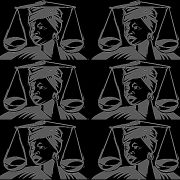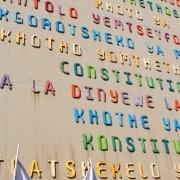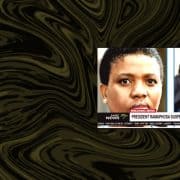|
Getting your Trinity Audio player ready...
|
The reported reinstatement of fraud charges against former deputy national director of public prosecutions Nomgcobo Jiba represents a welcome move towards accountability for those who abuse their high-level positions. It also has important implications for the likes of Malusi Gigaba, who was also found to have lied under oath by denying he had given the Oppenheimer family’s Fireblade Aviation permission to operate a private terminal at OR Tambo International. Gigaba has thus far escaped any serious sanctions.
Back in 2012, Corruption Watch had barely opened its doors when Jiba appeared on our radar, initially in relation to the drawn-out Richard Mdluli case. At the time, in May 2012, she was the National Prosecuting Authority’s (NPA) acting national director, and the NPA’s Pretoria head Glynnis Breytenbach had just been controversially suspended.
There was much speculation around Breytenbach’s suspension, not least because she had opposed the dropping of charges against Mdluli, and he and Jiba had an apparently close working relationship. He came to her defence after then NPA head Mokotedi Mpshe suspended her in 2007 for allegedly assisting a police investigation against former NPA prosecutor Gerrie Nel, who was at the time Gauteng head of the now disbanded Scorpions, formally known as the NPA’s Directorate of Special Operations.
In neutralising Nel, Jiba’s intention was allegedly to protect then National Police Commissioner Jackie Selebi from arrest.
The former head of the Commercial Crime Unit, Lawrence Mrwebi – another controversial appointment – was also suspended with Jiba for action against Nel.
Since then Jiba has been in the news regularly, often for the wrong reasons. In 2016 she and Mrwebi were struck off the roll of advocates in a case brought by the General Council of the Bar – only for that decision to be set aside by the Supreme Court of Appeal (SCA). After former Bosasa COO Angelo Agrizzi made fresh allegations against her at the commission into state capture, she and Mrwebi were fired in April 2019.
But going back even further, Jiba was facing perjury charges and a trial in 2015 for allegedly trying to manufacture a conviction against former KwaZulu-Natal Hawks head Johan Booysen. He and others were charged with murder, racketeering and contravening the Prevention of Organised Crime Act, a case that was publicised in the Sunday Times in 2011.
While Jiba’s charges were withdrawn in 2015 shortly after then national director of public prosecutions (NDPP) Shaun Abrahams was appointed, Booysen had to wait until 2019 for Abrahams’ successor Shamila Batohi to drop his case.
The Sunday Times, meanwhile, which had reported with relish on the so-called Cato Manor death squad that fell under Booysen, hung its head in shame in 2018 and admitted it had been wrong.
Is Jiba an influential role model for career women, someone who was scapegoated for the wrongdoings of others, or is she in fact the engineer of her own downfall? She started off in the late 1980s as a prosecutor in the Peddie magistrate’s court, Eastern Cape, and about a decade later joined the Cape Town-based Qunta Ntsebeza Attorneys as a candidate attorney. She joined the Investigating Directorate for Serious Economic Offences, and when this evolved into the Scorpions Jiba became a deputy director of public prosecutions. In December 2010 she was appointed a deputy national director of public prosecutions (DNDPP) at the NPA.
In this timeline of her career, we focus on the aspects that have been relevant to our work, namely the spy tapes case, the Mdluli case, and the Booysen case. Jiba’s involvement in and handling of these three cases form the basis of much of the criticism and court judgments that have been levelled against her, as they call into question the attributes of integrity, accountability and transparency.
- 2001: Jiba was appointed as deputy director of public prosecutions (DDPP) in the Office for Serious Economic Offenses which later evolved into the Scorpions, formally known as the NPA’s Directorate of Special Operations.
- 2007: Then NPA head Mokotedi Mpshe suspended Jiba – and Mrwebi – for allegedly assisting a police investigation against former NPA prosecutor Gerrie Nel, who was at the time Gauteng head of the now disbanded Scorpions. The disciplinary process never happened.
- 2010: Jiba became a deputy national director of public prosecutions in the NPA.
- 2011: In December Jiba was appointed as acting NDPP after the Supreme Court ruled that former president Jacob Zuma’s appointment of then head Advocate Menzi Simelane was invalid.
- 2012: In March Jiba, as acting NDPP, was ordered by the SCA, on appeal by the DA, to hand over the record of all documents and material that formed the basis of the decision to withdraw corruption charges against Zuma. She did not comply with the order.
- 2012: As acting NDPP Jiba allowed the withdrawal of charges against former crime intelligence head Richard Mdluli. She ignored or failed to consider an extensive memorandum sent to her in April by then advocates Glynnis Breytenbach and Jan Ferreira, thereby failing to exercise her discretion, as the Mokgoro inquiry concluded. Breytenbach was suspended on 30 April.
- 2012: In June Booysen and other members of his squad were arrested and charges with crimes that included racketeering, murder and attempted murder. Booysen claimed that this happened because he was investigating matters that involved members of Zuma’s family.
- 2013: Mxolisi Mxasana was appointed as NDPP in August, and Jiba returned to her role as DNDPP.
- 2013: In September in the North Gauteng High Court, Judge John Murphy ruled that the NPA must reinstate charges against Mdluli.
- 2014: In April, the SCA threw out the NPA’s appeal to Murphy’s judgment, ruling that charges must be reinstated against Mdluli.
- 2014: In a February court challenge to the charges against him, Booysen stated that in the 23 dockets the NPA had compiled to support the racketeering charges, he is mentioned in only two, while of 290 statements in all of the dockets, only three statements even mention him. Handing down judgment on 26 February, the Durban High Court found that: “The dockets could therefore not have provided a rational basis for arriving at the impugned decisions”. It ruled that Jiba’s decision to prosecute Booysen to be constitutionally inconsistent and invalid, and set it aside. Jiba did not appeal this ruling.
- 2015: In March, Nxasana filed charges of fraud and perjury against Jiba in connection with the Booysen case.
- 2015: In April Jiba appeared in the Specialised Commercial Crime Court on the above-mentioned charges, relating to her decision to prosecute Booysen. Conveniently, Nxasana stepped down soon afterwards, with a R17-million settlement.
- 2015: In August, newly appointed NPA head Shaun Abrahams announced that the case against Jiba would be dropped.
- 2016: In February the NPA announced that it would again take up the case against Booysen.
- 2016: On 15 September 2016 the North Gauteng High Court struck Jiba and Mrwebi off the roll of advocates. They appealed the judgment.
- 2017: In November the civil rights group Afriforum and former NPA prosecutor Gerrie Nel – now with Afriforum – announced that they would bring a private prosecution against Jiba.
- 2017: In December the High Court in Pretoria set aside Abrahams’ decision to withdraw the charges against Jiba. This effectively meant the NPA was obliged to reinstate them.
- 2018: In July the SCA overturned the decision to disbar Jiba and Mrwebi.
- 2018: On 20 October President Ramaphosa suspended Jiba and Mrwebi pending the completion of the Mokgoro inquiry, which was established to look into the fitness and propriety of both Jiba and Mrwebi to hold office in their respective capacities.
- 2018: On 9 November the terms of reference of the Mokgoro inquiry, chaired by retired Constitutional Court Justice Yvonne Mokgoro, were gazetted.
- 2019: The Mokgoro inquiry began its hearings on 21 January.
- 2019: On 24 January the Zondo commission into allegations of state capture heard testimony from former Bosasa COO Angelo Agrizzi that Jiba and Mrwebi were paid to obstruct an SIU case investigating four contracts that the company held with the Department of Correctional Services. They leaked important information so that Bosasa could know the SIU’s progress at any given time. Jiba reportedly received R100 000 per month and Mrwebi R10 000.
- 2019: In April the Mokgoro inquiry presented its report to Ramaphosa. It found both Jiba and Mrwebi unfit for office and recommended that the president remove the pair from their senior positions in the NPA.
- 2019: On 26 April Ramaphosa dismissed Jiba and Mrwebi, acting on the recommendation of the Mokgoro inquiry.
- 2019: In July the NPA announced that it would withdraw the racketeering charges against Booysen. A panel of senior advocates reviewed the case and concluded that, according to the evidence collected, “a proper case was not made out”. The panel decided that the authorisations from both Jiba and Abrahams to proceed with the case were therefore invalid.
- 2019: In October the Western Cape High Court threw out Jiba’s challenge to her dismissal. The court dismissed Jiba’s application with costs.
- 2019: In November Jiba wrote to Parliament stating that she would no longer fight to get her NPA job back. It had fallen to Parliament to decide whether or not to reinstate Jiba and Mrwebi.
- 2020: In August the media reported that fraud and perjury charges against Jiba would be reinstated. She reportedly has not received word about this from the NPA.







